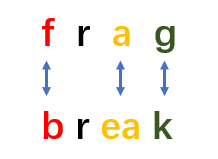第21期:What Do You Do? 你做什么工作?
「晨读音频」


Hey guys! Welcome to my channel, I’m Grace. Good morning!
欢迎来到我的频道,我是Grace老师,早上好呀!
Today we’re gonna listen to a dialogue about jobs.
今天我们要听一个关于谈论职业的对话。
Everyone needs a job, but we know each job has its own value. In this dialogue, you will hear that there is a guy who is too poud of his job and makes people feel a little bit uncomfortable.
每个人都需要工作,但是我们知道每一份工作都有它自身的价值。在这个对话中,你会听到有一个人对自己的工作太过于自豪而使得他人感到有点不太舒服。
Therefore, in some situation, we still need to be a little bit modest, don’t we?
因此,在某些场合下,我们还是需要稍微谦虚一些,不是吗?
Okay, let's see what's happening in this dialogue.
好的, 现在让我们看看在这个对话中发生了什么事吧。
「对话文本」
A: Oh, look, there’s Caroline and her boyfriend. She’s always going on about him at the office. Oh, great, they saw us. They’re coming this way.
噢,看,卡洛琳和她男朋友。她在办公室一直说她男朋友。噢,他们看到我们了。他们走过来了。
B: Oh, man...
噢,天......
C: Jessica! Arthur! Hi! I’d like you to meet my boyfriend Greg, he’s the V. P. of quality and safety for a top Fortune 500 food company.
杰西卡,亚瑟,嗨,给你们介绍下,我的男朋友格雷,他是一家世界五百强食品公司的质量安全体系副总裁。
A: Nice to meet you. This is my husband, Arthur.
很高兴认识你。这是我丈夫,亚瑟。
B: Hey, how’s it going?
嗨,你好吗?
D: Hello.
你好。
A: Caroline talks about you all the time. I guess you must be pretty busy at work.
卡洛琳经常说起你。我想你工作一定很忙吧。
D: Well, yeah, a V. P. position is not easy, you know! I implement policies and procedures nationwide of various departments, as well as train junior managers in FDA and EPA regulations. I also have to oversee daily operation of quality control for the entire East coast, that alone means I have 1500 employees under me.
嗯,是的。这个副总裁职位不容易,你了解的。我需要在全国范围内的部门执行相关政策和程序,同时,培训美国食品药品监督管理局和美国国家环境保护局法规的初级管理人员。我也必须要监督整个东海岸的日常运作,以保证质量的控制。这也就意味着约有1500名员工在我的部门。
B: Wow, yeah... that sounds exciting.
哇......这听起来很刺激。
D: And what about you, Arthur? What do you do for a living?
那么你呢,亚瑟?你做什么工作呢。
B: Oh, I’m a Top Gun pilot!
哦。我是一名特级飞行员!

「重要发音技巧」
Welcome back. Now let’s focus on some important tips of pronunciations.
欢迎回来。现在让我们关注一些重要的发音技巧。
1. 重音的位置
一般情况下,句子中的名词、动词、形容词、副词,指示代词(this/that/ these/those),特殊疑问词(why/what/which/where)等需要重读,还有句子中的功能性单词,冠词(a/an/the)等, 人称代词(I/he/she)等, 位置介词(in/on/behind)等,连词(and/but)等, 助动词(do/does)等也是需要重读的。但是在句子中,如果为了特殊强调某项内容,那么不受上述规则的限制。
(1) This is my husband, Arthur.
重音分析:按照我们刚刚讲的规则,这里的指示代词This就是要重读的单词。
(2) Caroline talks about you all the time.
重音分析:这里可以根据句子的含义来决定,句中强调的内容是Caroline谈论她男友的频率是all the time,那么这里的all就需要重读。
2. t y变音
如果前一个单词是以t结尾后面一个单词是y开头的,那么他们之间组合在一起会发生变音。
(1) Nice to meet you.
变音分析:其中 meet的尾音/t /和you前面的音/j/,那么t和y就会变成[t∫]这个音。
(2) I hate you.
变音分析:其中hate的尾音/t /和you前面的音/j/,那么同样这里的t和y还是会变成[t∫]这个音。
3. 辅元连读
前后两个单词,前一个单词的最后一个音标是辅音,后一个单词的第一个音标是元音,通常要连读。
(1) Caroline talks about you all the time.
连读分析:talks结尾是辅音/s/ 而后面的about开头是元音/ʌ/,读为 [tɔːksəˈbaʊt]。
(2) What about you?
连读分析:What结尾是辅音/t/ 而后面的about开头是元音/ʌ/,读为 [wɑːt əˈbaʊt]。
「核心单词掌握」
1. implement [ˈɪmplɪmənt] v.实施
It means to put into action.
指的就是付诸于行动。
例句:
Our company has to implement this sales strategy.
我们公司必须实施这个销售战略。
2. policy [ˈpɑːləsi] n. 政策
It means rules and regulations, especially formal rules.
指的是规则和规章制度,特指正式的规章制度。
例句:
I think that is a good policy .
我认为那是一项好政策。
3. oversee [ˌoʊvərˈsiː] v. 监督
同义词:supervise
例句:
We oversee the entire quality-control process for food procurement.
我们全程监督食物采购过程中的质量要求标准。
4. president [ˈprezɪdənt] n. 总统,总裁,董事长
vice president 副总裁,副总统
例句:
I think that the vice president was in the loop.
我认为副总统是局内人。
I have become a vice president, but that hasn’t changed the way I approach people.
现在我已经成了公司的副总裁,但是这并没有改变我待人接物的方式。
5. fortune [ˈfɔːrtʃən] n. 财富, 运气
It means a large amount of money, chance or luck, especially in the way it affects people’s lives.
这指的是大笔钱或者是指机会运气,特别是能够影响人们的生活的机会或运气。
Fortune 500 财富500强
Well, Fortune Magazine ranks the five hundred biggest companies in the U.S.
嗯,《财富》杂志对美国500家最大的公司进行了排名。
So, a Fortune 500 company basically is one of the five hundred biggest companies in the U.S.
所以一家财富500强公司基本上指的是在美国的前五百家大型公司中的一个。
常用搭配:
make a fortune 发财
He made a fortune in real estate.
他在房地产上发了财。
have a / the good fortune to do something
有幸做某事
I have had the good fortune to work with some brilliant directors.
我有幸与一些卓越的主管人员共事。
「实用口语表达」
1. She’s always going on about him at the office. 她总是在办公室说到他。
go on about... 说到/谈论到......At the beginning of the dialogue, Jessica said, “She’s always going on about him at the office.” This is a very natural way to say (that) someone keeps talking about something.在段落开头,Jessica说“她总是在办公室说到他。”这(go on about something)是一种非常自然的表达方式去描述某人“不停谈论(keep talking about something)”某件事情。
Let’s see some other examples.让我们看一看其他的例子。
例句1:
Gary is always going on about his kids; he’s always talking about how smart they are. 加里总是不停地谈论他的孩子们;他总是说他们多么聪明。 例句2:
My mom is always going on about how I should get married. 我妈总是唠叨我该怎么结婚。
2. How’s it going? 你最近怎么样?This is a really relaxed and natural way of saying “How are you?”. 这是以一种放松自然语气说“ How are you?”的方式。How are you? = How’s it going?
例句:
Hi, Ann! I’m really happy to see you again. How’s it going?嗨,安妮!很高兴再次见到你。你最近怎么样?
3. What do you do for something?你做什么工作?Arthur, what do you do for a living?亚瑟,你是做什么的?This is a really great way of asking “What work do you do?” or “What is your job?” 这是问“你做什么工作?”或者“你的工作是什么?”的一个非常好的询问对方工作的方式。
Some of my students like to say “What is your job?”
我的一些学生有时会喜欢说“你的工作是什么?”It doesn’t sound very natural. 听起来有点不太自然。The authentic way to express it will be “ What do you do?” or “What do you do for a living”?地道的表达方式可以说“你做什么工作?”或者“你做什么的(用来谋生)?”
Here we can learn the sentence structure “What do you do for something?”.
这里我们可以学习一下这个句型 “What do you do for something?”。
Here is an extra example:这里有一个额外的例子:What do you do for entertainment out here?你在这里有什么消遣?
「今日所学回顾」
1. 发音技巧:
重音的位置: This is my husband, Arthur. Caroline talks about you all the time. t y变音: Nice to meet you. I hate you. 辅元连读: talks about What about...
2. 核心词汇:
implement v.实施 policy n. 政策 oversee v. 监督 president n. 总统,总裁,董事长 fortune n. 财富, 运气
3. 口语表达:
How’s it going? 你最近怎么样?go on about - keep talking about 说到/谈论到What do you do for something? 你做什么工作?
That’s all for today. Thanks for listening. See you next time and have a great day!
我们这期的学习就到这里了,感谢收听,下期再见。祝愿大家度过美好的一天!

懒人英语晨读
陪你学英语

- 0000
- 0000
- 0000
- 0000
- 0000










